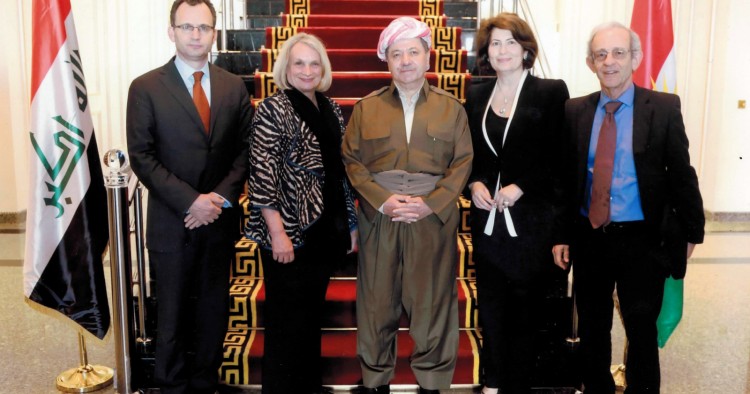The Middle East Dialogue is a Track II forum focusing on emerging political and security trends in the region that meets twice a year, bringing together current and former officials and senior experts from Egypt, Saudi Arabia, the UAE, Iraq, Iran, Turkey, Jordan, Lebanon, Kuwait, the United States, Russia, China, and the EU. Members of the delegation, led by The Middle East Institute's president, Wendy Chamberlin, met March 31 with Kurdistan Regional Government (KRG) President Massoud Barzani in Erbil, the capital of Iraqi Kurdistan. What follows is a summary of Barzani’s remarks:
There is a long history of difficult relations between Iraq’s two main groups, the Arabs and the Kurds. Following the First World War and the formation of modern Iraq, Baghdad broke agreements with the Kurds, persecuted and attacked them, destroyed many of their villages, and used chemical weapons against them. The Kurds have not responded in kind. They have avoided revenge, taking the high road and practicing tolerance. They have fought for survival, national identity, and a better future. The international community after 1991 provided the Kurds a measure of protection by enforcing the no-fly zone. Prosperity and economic growth resulted.
The Kurds are grateful for the U.S. intervention in Iraq in 2003. They and their fellow Iraqis in the anti-Saddam opposition could not have overthrown Saddam Hussein and the Ba‘th regime without help. But after the initial liberation, the United States made many mistakes. It was a mistake to turn from liberation to occupation. It was a mistake not to allow the Kurds to declare independence. Pre-war Iraqi opposition plans were not implemented. The Kurdish experience, which could have been helpful to all of Iraq, was not exploited.
The Kurds have done their best to be supportive and not to create problems. The Iraqi constitution is a good one, but it lacks implementation. Prime Minister Nuri al-Maliki is not honoring it. He came to power as the result of a consensus that the Kurds supported, but he has now hijacked the government. Even the religious marja‘iyya in Najaf is unhappy with him. Maliki is withholding funds needed to pay salaries to KRG public servants and is preventing the sale of KRG oil. He accuses the Kurds of stealing oil and threatens revenge. The Kurds now fear Iraq is going backward, becoming less tolerant and more authoritarian. The western part of Iraq is out of government control. The people there do not receive services, and there is no security or stability. The Kurds, who want to see democracy in Iraq, fear that it will be a failed state. They will not accept another authoritarian leader.
Iraq is at the brink, and the outcome of the upcoming parliamentary elections might be critical. If there is full commitment to respecting and applying the constitution, the Kurds will cooperate in building the state. The issues that have to be resolved between Erbil and Baghdad include sharing power, the hydrocarbons law, the extent of KRG autonomy, and the architecture of the state. Will it be a federation or a confederation?
The lack of an oil law allows Erbil to export its own resources, which it has a right to explore and produce. When a hydrocarbons law is passed, the KRG will abide by it. Erbil is not seeking confrontation with Baghdad. Foreign policy in Iraq is Baghdad’s responsibility, but Erbil helps to implement it. Improved relations between the KRG and Turkey are an example, and they are in Baghdad’s interest. The KRG wants partnership, but if that is not possible it will call a referendum among its people to decide on its long-term status, within or without Iraq.
The biggest threat to Iraq is extremist terrorism. Forces from outside Iraq are contributing to that threat. The states that support terrorism will find that their policies backfire. Kurdistan aims to be a factor of stability in the region. It has good relations with all its neighbors, and poses no threat.
But the complicated crisis in Syria is generating instability, with no solution on the horizon. The horror is continuing. Two hundred and fifty thousand refugees from Syria have entered Iraqi Kurdistan, including 26,000 Christians. There were already almost that many internally displaced Iraqis from outside Kurdistan, and Kurdistan seeks the kind of help provided to other countries hosting Syrian refugees.
The KRG does not take sides in the Syrian conflict. It is up to the Syrian people to decide their future. But the Syrian Kurds should work for unity. Most of them were deprived of citizenship and identity in Syria. One Kurdish group, the PYD, has sided with the Assad regime, so it receives no support from the KRG. Terrorism in Syria is an international problem. There are even 7,000-9,000 fighters from Europe in Syria.
Kurdistan appreciates Gulf support and investment, and it appreciates the roles of the United States and Turkey. It wants to contribute to a stable and prosperous Iraq. But the next ten years are difficult to predict—anything is possible.
Photo caption (from left to right): MEI Vice President Paul Salem, MEI President Wendy Chamberlin, KRG President Massoud Barzani, Director of MEI's Track II Initiatives Randa Slim, and MEI Adjunct Scholar Daniel Serwer.
The Middle East Institute (MEI) is an independent, non-partisan, non-for-profit, educational organization. It does not engage in advocacy and its scholars’ opinions are their own. MEI welcomes financial donations, but retains sole editorial control over its work and its publications reflect only the authors’ views. For a listing of MEI donors, please click here.













